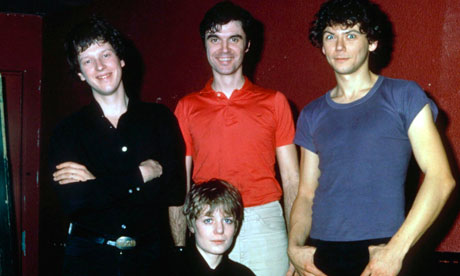
"At the peak, in 1980 or 1981, my identification was so complete that I might have wished to wear the album Fear of Music in place of my head so as to be more clearly seen by those around me." Thus Jonathan Lethem lays his cards on the table early but, unlike some volumes in Continuum's versatile 33⅓ series about classic albums, his book is no memoir. Nor does it concern itself with external data about recording sessions or late-70s New York. It's a single-minded investigation into why Talking Heads' extraordinary third album should be as addictive and puzzling to the middle-aged novelist as it was to the teenage fan he refers to as "the boy in the room".
The album merits a listener's obsession. It has weight, and its noun-heavy song titles (Mind, Paper, Air) resemble, notes Lethem, a list of "topics for study". Frontman David Byrne magnified his personal sense of unease into an engulfingly paranoid vision that implied that everything in the world (not excluding the record itself) meant you harm. It is like a musical version of a Twilight Zone episode in which a man builds an airtight bunker to shut out the horrors of the world only to find out, after he's locked the door, that the real horror is inside.
Of course it's much more than that. Lethem, who writes about music better than most professonal critics, explores every possibility, considers every angle, unpacks every generalisation the boy in the room made. An album is neither an academic thesis nor a crossword puzzle with one set of solutions. Interstitial chapters are pitched as questions ("Is Fear of Music a Science Fiction Record?", "Is Fear of Music an Asperger's Record?") and theories about individual songs are fluid and self-questioning. You could describe the book, as Lethem describes the album, as "a constellation of inklings".
But there is nothing cautious about his prose. The grinding, monstrous Memories Can't Wait "mugs you, frisking your pockets for your last dime of hope." Byrne sings the absurdist, self-satirising Animals "in the manner of an outraged citizen taking over a previously orderly city council session, finding voice for screwball gripes he's nursed his whole life." Lethem's book demonstrates what happens when the twin beams of passionate fandom and slicing critical intelligence intersect to illuminate a record you only thought you knew. This has always been my favourite Talking Heads album, but as I played it over and over while reading Lethem's thoughts, I felt that I'd barely scratched its surface. So be warned: his obsession is contagious. By the end I was right there with him, inside the bunker.

